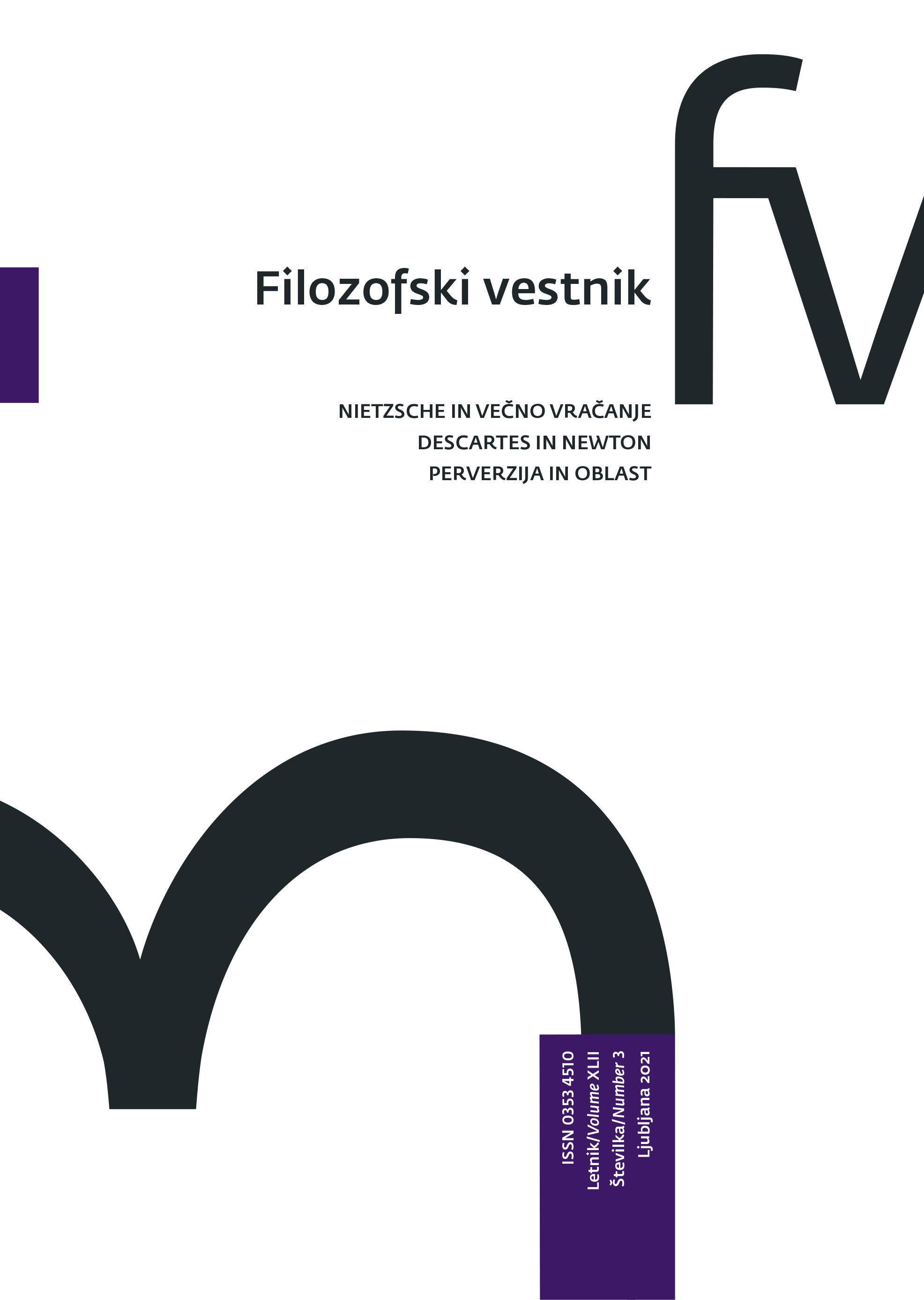Rousseau, Nietzsche in vprašanje srca
DOI:
https://doi.org/10.3986/fv.42.3.03Ključne besede:
avtobiografija, spomin, afirmacija, srce, volja, naravno stanje, naključjePovzetek
Rousseau in Nietzsche sta filozofa, med katerima le stežka vzpostavimo dialog, ki bi izhajal neposredno iz njunih del in vendar se med njunima filozofijama spletajo povezave ali, rečeno z Nietzschejem, perspektive, ki odpirajo skupno vprašanje: vprašanje vrednotenja. A na kaj se nanaša vrednotenje, na katero vrednost oziroma na vrednost česa se nanaša? Pokazati želimo, da gre za vrednotenje sedanjika v katerem se izvaja mišljenje, ki se vrača kot spomin tako kontinuitete sledi, kot njenih prekinitev. Vendar spomin se vrača bodisi kot resentiment in volja po maščevanju, torej samonegacija spomina, ki nikdar ni adekvaten, bodisi kot afirmacija tega, ki se spominja in tega, kar se v spominu vrača, vključno z diskontinuitetami. Kot odgovor na ta problem Rousseau iznajde proto-pojem srca, ki se v bolj ali manj pojmovni obliki pojavlja tako v njegovih avtobiografskih kot politično teoretskih delih, ne da bi mu Rousseau kdaj deklariral mesto v svoji filozofiji. Trdimo, da srce pridobi svojo pojmovnost šele ko ga prepoznamo kot centralni in plastični princip njegove misli, ki strukturno ustreza Nietzschejevi volji do moči. Slednjo Deleuze označi za plastični princip Nietzschejeve filozofije, kot princip vrednotenja in prevrednotenja vrednot in kot princip vrednotenja tega, kar se more in mora vračati v mišljenju.
Prenosi
Literatura
Althusser, Louis, Predavanja o Rousseauju, prev. A. Mendiževec, Maribor, Študentska založba Litera, 2017.
Bahovec, Eva, »Rousseaujeva filozofijo srečanja«, Problemi, 55 (3-4/2017), str. 133–156.
Bahovec, Eva, »Filozofija in avtobiografija: primer Nietzsche«, v A. Leben, A. Koron (ur.), Avtobiografski diskurz: teorija in praksa avtobiografije v literarni vedi, humanistiki in družboslovju, Ljubljana, Založba ZRC, 2011.
Bunta, Aleš, »Govorica in izbrisani zakon večnega vračanja enakega«, Problemi, 57 (7-8/2019), str. 31–57.
Deleuze, Gilles, Nietzsche in filozofija, prev. A. Kravanja, Ljubljana, Krtina, 2011.
Derrida, Jacques, O gramatologiji, prev. U. Grilc, Ljubljana, DTP, 1998.
Klosowski, Pierre, Nietzsche and the Vicious Circle, prev. D. W. Smith, London, The Athlone Press, 1997.
Nietzsche, Friedrich, Človeško, prečloveško, prev. A. Leskovec, Ljubljana, Slovenska matica, 2005.
Nietzsche, Friedrich, Tako je govoril Zaratustra, prev. J. Moder, Ljubljana, Slovenska matica, 1999.
Nietzsche, Friedrich, »Ecce homo«, v Somrak malikov ali Kako filozofiramo s kladivom; Primer Wagner: problemi glasbenikov; Ecce homo: kako postaneš, kar si;Antikrist: prekletstvo nad krščanstvo, prev. J. Moder, Ljubljana, Slovenska matica, 1989.
Rousseau, Jean-Jacques, Družbena pogodba ali Načela političnega prava, 3. popravljena izd.; Razprava o izvoru in temeljih neenakosti med ljudmi, 2. popravljena izd., prev. M. Veselko ml., T. Jurkovič, Ljubljana, Krtina, 2017.
Rousseau, Jean-Jacques, Esej o izvoru jezikov, v katerem se govori o melodiji in glasbenem posnemanju, prev. S. Perpar Grilc, Ljubljana, Krtina, 1999.
Rousseau, Jean-Jacques, Rousseau Judge of Jean-Jacques, prev. J. R. Bush, C. Kelly, R. D. Masters, Hanover, London, University of New England, 1990.
Rousseau, Jean-Jacques, Les Rêveries du Promeneur solitaire, Lausanne, Éditions Rencontre, 1968.
Rousseau, Jean-Jacques, Izpovedi, prev. S. Škerl, Ljubljana, Slovenska matica, 1955.
Starobinski, Jean, Transparency and Obstruction, prev. A. Goldhammer, Chicago, University of Chicago Press, 1988.
Prenosi
Objavljeno
Verzije
- 2022-04-06 (4)
- 2022-04-06 (3)
- 2022-04-06 (2)
- 2021-12-31 (1)
Kako citirati
Številka
Rubrike
Licenca
Avtorske pravice (c) 2021 Avtorji

To delo je licencirano pod Creative Commons Priznanje avtorstva-Nekomercialno-Brez predelav 4.0 mednarodno licenco.
Avtorji jamčijo, da je delo njihova avtorska stvaritev, da v njem niso kršene avtorske pravice tretjih oseb ali kake druge pravice. V primeru zahtevkov tretjih oseb se avtorji zavezujejo, da bodo varovali interese založnika ter da bodo povrnili morebitno škodo.
Podrobneje v rubriki: Prispevki





